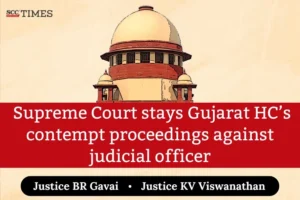Supreme Court: In a special leave petition filed by a Judicial Officer against the decision of the Gujarat High Court allowing an application for joining him as a party to the contempt petition for allegedly violating this Court’s guidelines in Arnesh Kumar v. State of Bihar, (2014) 8 SCC 273, the Division Bench of BR Gavai and KV Viswanathan, JJ. issued notice and stayed the contempt proceedings against the Judicial Officer/ petitioner herein.
Genesis
An application was filed by the respondent herein for joining his respondents 4, 5 and 6 therein who are judicial officers and public prosecutors respectively, as party respondents in the main contempt petition for being instrumental in wilful and contentious violation of the directions issued by the Court in Arnesh Kumar (supra) and to initiate contempt proceedings against these Judicial Officers under Article 215 of the Constitution of India, read with Contempt of Courts Act, 1971. The applicant/ respondent herein alleged that there was a blatant violation of the directions of the Court, where he was arrested for an offence, which had a matrimonial issue at the root of it, and was arrested from his residence at odd hours and was taken to Patan Police Station where the respondents therein were posted as Judicial Officers, including the present petitioner. The present respondent has an ongoing matrimonial dispute with respondent 4 therein. The applicant was not given any reasons for his arrest or any documentary evidence in this regard and was taken in a private car from Baroda to Patan, which is approximately 250 km away. It was alleged that the police authorities were acting on the say of Judicial Officers, including the present petitioner. Allegedly, money was sought from the respondent who was forced to sign the divorce agreement and relinquish entire rights towards his minor daughter.
High Court’s Order
The High Court found the Judicial Officers and the public prosecutor to be responsible of the allegations made against them and acted in contempt of the directions in Arnesh Kumar (supra). The High Court viewed that a case was made out for allowing the application for joining them party respondents to the main petition and therefore, allowed the application.
CASE DETAILS
|
Citation: Appellants : Respondents : |
Advocates who appeared in this case For Petitioner(s): For Respondent(s): |
CORAM :

